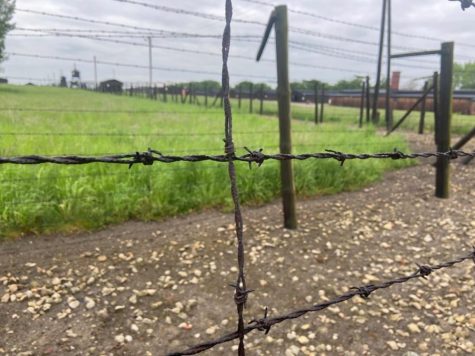Poland. The beautiful, awful country. A country that has both life and death. Poland, a country of green grounds scattered with mustard flowers. But beyond those mustard flowers is death. Life and death is what Poland is. And I think there is a beauty to that.
To find the beautiful moments in the most difficult situations is often a hard thing to do. I could not do it with my grandmother’s death back in February, but I was able to do it here. I saw flowers and reflections at the pool of ashes at Auschwitz. I saw singing at the graves. I saw the epitome of Jewish mitzvot with the burial at Chelmno, but at Majdanek, I saw nothing.
I saw the barracks as the color of death. I saw the blue coloring of the roof as the atrocity of the entire situation. The gas chambers were the worst of it. I heard the screams of the children. The crying of the mothers. The lack of protection by the fathers. There was no beauty in that place. None. But then we started to sing.
I struggled this trip to feel God. To feel a connection to a spiritual being in an awful place. He did not help. He left the “Chosen People” to die and had no intention of assisting them. I could not find the meaning in the words we said daily in the songs – “Protect us God” – when He did not protect us then. So I did not sing with a reason but just because it sounded good to my ears.

After Dr. Keiter’s speech about being at Auschwitz on Mother’s Day and the courage that the people had to have when they died, I started to feel a connection growing. However, it was not fully there. I was still at a loss for words with God. With the atrocities that happened in Poland throughout World War II.
What changed me was Talia Schapira, who through her tears in the crematorium said to Rabbi Block, “Can we sing V’hi She’amda?” That is when I felt it. I felt the terrors of Majdanek. I felt the children that died. I felt the parents that could not protect the one thing they swore to. It was powerful. It was inspiring. It was God.
I felt it. We carry the spirits of every soul who died in the Holocaust. We do. It is our responsibility to carry on the legacy of the Holocaust.
Surprisingly, this all reminded me of the end of Hamilton: The Musical. At the end of the musical, they sing “Who lives, who dies, who tells your story?” It’s phrased as a choice, but the people in the Holocaust did not have one. We do. We have to choose to continue to tell the story. For the rest of our lives, as the number of survivors inevitably decreases, it becomes our responsibility to carry on the stories of those lost.
May their memory bless us, as we remember.
This story appeared in The Boiling Point on May 16, 2023.












